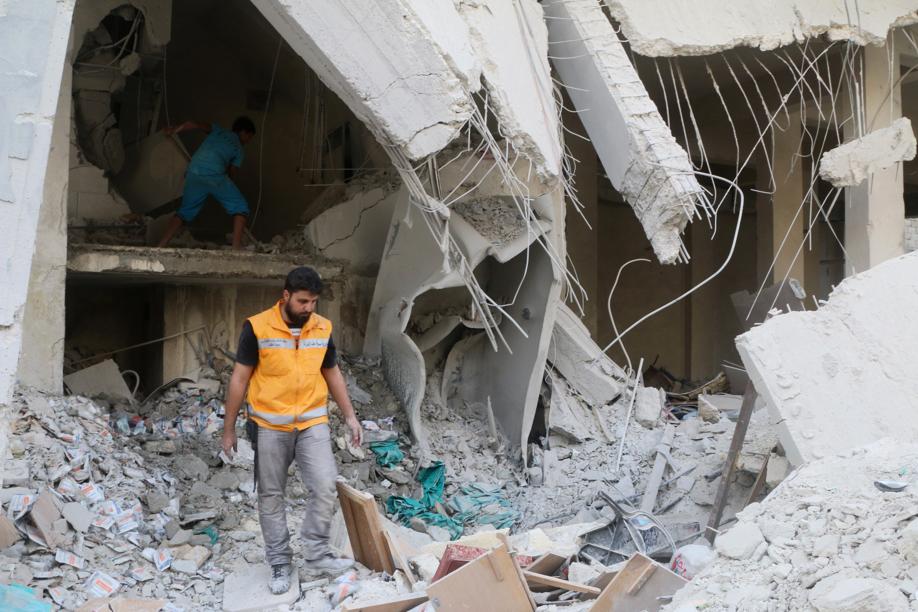
ALEPPO, Syria — On the edge of Aleppo’s ancient citadel, Zahra and her family squatted in a once-grand apartment, now facing rebel lines. Plastic sheets covered its tall windows to shield the space from a sniper’s view; shelling boomed in the distance.
Zahra, 25, who gave just one name, flicked between two photos on her phone. The first showed her husband, a Syrian army soldier and the father of her unborn child. “Seven months,’’ she said, touching her belly.
In the second, her husband was splayed on the ground, blood trickling from his nose. Two other fallen soldiers lay beside him. He died two weeks ago.
“May the men who did this also die,’’ she said with quiet determination.
Four years of war have hardened hearts in Aleppo, a divided city and, for the past week, the scene of merciless fighting.
Over the past week, a fragile truce, brokered by the United States and Russia, has crumbled in Syria, leading to the worst violence in months. Russian fighter jets roar through the sky, pounding targets in rebel-held areas. The rebels send barrages of mortars and homemade missiles that land in crowded neighborhoods. The war has stoked sectarian tensions and become a proxy battle for regional and global interests.
Most casualties are civilians — at least 202 in the past week, about two-thirds in rebel-controlled eastern areas and the remainder in the government-held west side, according to groups that monitor casualties. The violence shows a “monstrous disregard for civilian lives,’’ the United Nations’ human rights chief, Zeid Ra’ad al-Hussein, said Friday.
One of the world’s oldest inhabited cities, Aleppo has for centuries been known as the crossroads of empires, with Ottoman, Armenian, Jewish, and French influences. Today the only way in, on the government side, is via a lonely road that cuts through hostile territory: a bumpy tarmac strip lined with deserted villages and isolated government outposts.
I was traveling with my translator and a Syrian government minder. Traffic moved at a brisk pace: Syrian rebels held territory to the east of the road, and Islamic State militants held it to the west.
Our first sight of Aleppo was its ravaged southern neighborhoods — a vista of devastation that has become a familiar image of Syria’s multiyear conflict.
Like many war zones, other parts bustled with a semblance of normalcy. Traffic officers directed vehicles, laughing children poured out of schools, and shoppers bustled through stores that sold food and artisanal perfumes. People seemed strangely immune to the background beat of explosions — thuds, crashes, and bangs — that provide a deadly metronome to their daily existence.
That phlegmatic attitude, though, is little more than a form of war-weary roulette. Whistling death, in the form of mortars and rockets, can fall from the sky in any corner of the city at any time. During our first dinner, in an upmarket restaurant, we were jolted by the whoosh of a departing rocket, its engine thrumming for seconds before it launched, apparently from a nearby park.
The old city’s sprawling medieval souk, considered one of the Arab world’s finest — and a UNESCO World Heritage site — is now a wasteland. Down a deserted street, a woman in fatigues sat in a bunker, boasting of how she once cared for tigers for a living at the Aleppo zoo.
Her nine-year career as a zookeeper was cut short when the rebels occupied the zoo four years ago, prompting her to join the fight, she said. Now she is a frontline fighter.
The nearest rebel position was about 100 feet away, she said — quiet for now, but unlikely to last. “They only dare come out at night,’’ she said. “They are like bats, cowardly bats.’’
A shell crashed into a nearby building with a deafening bang. A vehicle careened down the street, driven by another soldier. Jaffer did not flinch, but advised my translator and me to move on.
Although Syria’s revolt started as a protest against the authoritarian rule of President Bashar Assad, whose family has ruled Syria for 46 years, it has stirred sectarian tensions and century-old historical grievances. Most of the city’s Armenian population, known for its goldsmiths, has fled to Europe or Canada. Many of those who remain are staunch supporters of Assad, whom they see as their only hope against Islamist fighters who would never let them live in peace.
Father Iskander Assad, a Greek Orthodox priest, lives in Maidan, a frontline neighborhood that is now half-deserted. A day earlier, a mortar slammed into his home, punching a hole in the roof. His wife had been crying all night, he said, but he was not interested in sympathy.
“Sorry is no good,’’ he said. “We need a solution. Sorry solves nothing.’’



